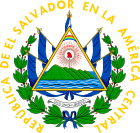This article needs additional citations for verification. (March 2018) |
Politics of the Republic of El Salvador Política de la República de El Salvador | |
|---|---|
 | |
| Polity type | Presidential republic |
| Constitution | 1983 Constitution of El Salvador |
| Formation | 15 September 1821 |
| Legislative branch | |
| Name | Legislative Assembly |
| Type | Unicameral |
| Meeting place | San Salvador |
| Presiding officer | Ernesto Castro, President of the Legislative Assembly |
| Executive branch | |
| Head of state | |
| Title | President of El Salvador |
| Currently | Nayib Bukele |
| Appointer | Elected by the citizenry |
| Cabinet | |
| Current cabinet | Cabinet of Nayib Bukele |
| Judicial branch | |
| Name | Supreme Court of Justice |
| Courts |
|
| Chief judge | Óscar Alberto López Jerez |
 |
|---|
|
|
Politics of El Salvador takes place in a framework of a presidential representative democratic republic, whereby the President of El Salvador is both head of state and head of government, and of an executive power is exercised by the government. Legislative power is vested in both the government and the Legislative Assembly. The Judiciary is independent of the executive and the legislature. El Salvador was ranked 5th least electoral democratic country in Latin America and the Caribbean according to V-Dem Democracy indices in 2023 with a score of 0.378 out of 1.[1][2]
- ^ V-Dem Institute (2023). "The V-Dem Dataset". Retrieved 14 October 2023.
- ^ Democracy Report 2023, Table 3, V-Dem Institute, 2023